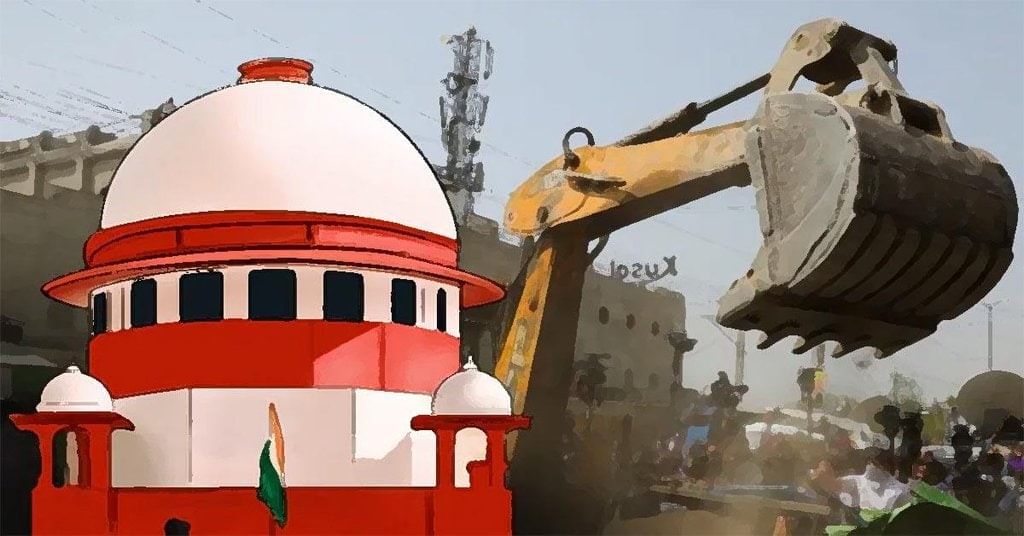UPSC Exam > UPSC Notes > Current Affairs & Hindu Analysis: Daily, Weekly & Monthly > The Hindu Editorial Analysis- 15th November 2024
The Hindu Editorial Analysis- 15th November 2024 | Current Affairs & Hindu Analysis: Daily, Weekly & Monthly - UPSC PDF Download

Razing Impunity
Why in News?
The Supreme Court used its authority from Article 142 of the Constitution to set out rules for how to properly follow the law when demolishing the homes of individuals accused of crimes.
- This decision was made in response to several instances where government officials reportedly destroyed properties as a form of punishment.
- The Chief Justice of India referred to this practice as "bulldozer justice", highlighting the unfairness of such actions.
What is the Case Background?
- The Supreme Court's decision looked at requests that challenged the practice of demolishing homes of people accused of crimes.
- This action has been observed in states like Uttar Pradesh, Madhya Pradesh, Uttarakhand, and Rajasthan, leading to claims of bias and a failure to follow due process.
- The court's ruling came after recent incidents in Ratlam (Madhya Pradesh) and Udaipur (Rajasthan), where demolitions were associated with accusations against relatives involved in communal or criminal activities.

SC Guidelines on Demolition Procedures:
- Mandatory notice period:
- The Court requires that at least 15 days notice be given to the property owner or resident before any demolition takes place.
- This notice must explain the reasons for the demolition and arrange a "personal hearing" for property owners to dispute the decision.
- Hearing and final order:
- The authorities are obligated to hold a hearing and keep a record of all the discussions.
- The final order for demolition must include the owner's arguments, the reasons for demolition, and whether the demolition will be full or partial.
- The Court has stressed that demolitions should only happen as a last resort and only when absolutely necessary.
- Post-order process:
- If a final demolition order is given, there will be a 15-day period for the owner to either take down the structure or appeal the decision in court.
- The authorities must also record a video of the demolition and create an inspection and demolition report that lists all the personnel involved.
SC’s Reasoning Behind the Guidelines:
- Separation of powers:
- The Court stated that it is the job of the judiciary, not the executive branch, to decide if someone is guilty.
- It stressed that punishing someone by destroying their property without a court trial goes beyond what the executive can do.
- Public trust and accountability:
- The Court pointed out the importance of being transparent and that public officials must be responsible for any misuse of power.
- This is especially true when demolitions are aimed at properties just because the owner is accused of something.
- Right to shelter:
- The Supreme Court observed that demolishing homes impacts not only the accused but also their family members.
- These family members have a constitutional right to shelter, as stated in Article 21 of the Constitution.
- The guidelines are meant to protect these individuals from losing their homes unfairly.
Demolition Laws and Practices Across Indian States:
- Rajasthan: According to the Rajasthan Municipalities Act, authorities can take away properties that are built on public land. They must provide a written notice explaining the reasons for taking the property and give the owner a chance to respond.
- MP: The MP Municipalities Act allows for the demolition of unauthorized buildings only after the owners have been given notice.
- UP: Under the UP Urban Planning and Development Act, an owner must receive at least a 15-day notice before any unauthorized structure can be demolished. The owner has the right to appeal the order, but once it is finalized, it cannot be challenged in court.
- Delhi: The Delhi Municipal Corporation Act permits the removal of unauthorized buildings, provided the owner is given a reasonable opportunity to appeal.
- Haryana: Similar to Delhi's act, the Haryana Municipal Corporation Act allows owners a short time to contest demolitions, but they only have 3 days to comply with the demolition orders.
Impact of the SC’s Verdict:
- Providing a path forward: Families affected by the situation are hopeful that the court's decision will encourage local authorities to offer restitution, which could come in the form of either financial compensation or the return of destroyed properties.
- Challenges in implementation: Although the Supreme Court's ruling emphasizes the need for transparency and accountability, there remain obstacles in making sure that compensation actually reaches those who have already suffered losses.
- Future policies must focus on the issue of restitution, making sure that fair outcomes are achieved for those who have been unfairly affected by what is known as “bulldozer justice.”
Conclusion:
- By protecting the right to have a place to live and making sure the government is held responsible, the Court seeks to stop what is known as "bulldozer justice" and ensure the government acts within the rules set by the constitution.
- Yet, for people who have already lost their homes, the fight for fairness continues, as there are still many unanswered questions about how to make things right for them.
The document The Hindu Editorial Analysis- 15th November 2024 | Current Affairs & Hindu Analysis: Daily, Weekly & Monthly - UPSC is a part of the UPSC Course Current Affairs & Hindu Analysis: Daily, Weekly & Monthly.
All you need of UPSC at this link: UPSC
|
38 videos|5293 docs|1118 tests
|
FAQs on The Hindu Editorial Analysis- 15th November 2024 - Current Affairs & Hindu Analysis: Daily, Weekly & Monthly - UPSC
| 1. What is the significance of the term 'impunity' in the context of governance and law enforcement? |  |
Ans. Impunity refers to the exemption from punishment or freedom from the injurious consequences of an action. In the context of governance and law enforcement, it signifies a lack of accountability for officials or individuals who commit unlawful acts. This can lead to a culture of corruption and a deterioration of public trust in institutions.
| 2. How does impunity affect the rule of law in a society? |  |
Ans. Impunity undermines the rule of law by creating an environment where laws are not applied equally to all individuals, particularly those in power. When offenders are not held accountable, it erodes the credibility of the legal system and can lead to increased crime rates and social unrest.
| 3. What measures can be taken to combat impunity in a country? |  |
Ans. To combat impunity, several measures can be implemented, including strengthening judicial independence, ensuring transparent investigations, enforcing laws fairly, promoting accountability through oversight mechanisms, and encouraging civic engagement to hold authorities accountable.
| 4. What role does civil society play in addressing issues of impunity? |  |
Ans. Civil society plays a crucial role in addressing impunity by advocating for human rights, raising awareness about injustices, supporting victims, and pressuring governments to implement reforms. They can also monitor state actions and promote transparency and accountability through activism and legal initiatives.
| 5. How can international organizations assist in reducing impunity in various countries? |  |
Ans. International organizations can assist in reducing impunity by providing support for legal reforms, offering training for law enforcement and judicial personnel, facilitating dialogue between governments and civil society, and applying diplomatic pressure or sanctions on regimes that perpetuate impunity.
Related Searches





















